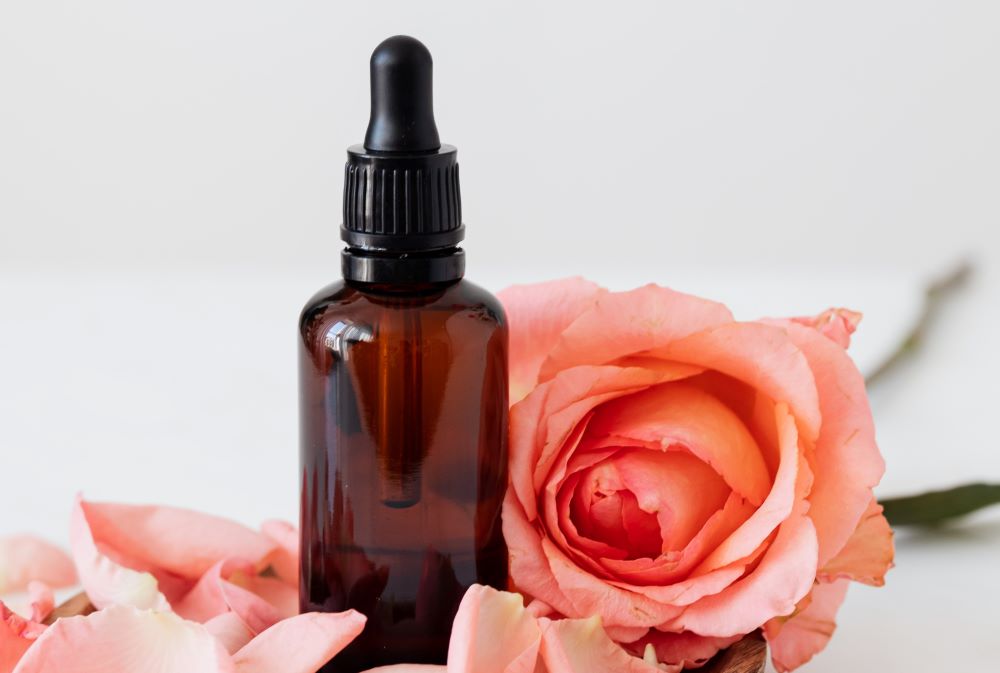The Benefits of Rose Oil
Rose oil has a wide range of therapeutic properties that make it beneficial for physical, mental, and emotional health. It is anti-inflammatory, antimicrobial, antispasmodic, astringent, cicatrisant (wound-healing), emmenagogue (menstruation-regulating), expectorant, sedative, and tonic. It also has antioxidant and anti-cancer properties. Here are some of the benefits of rose oil:
- Skincare: Rose oil is excellent for all skin types, especially dry, mature, or sensitive skin. It moisturizes, soothes, and nourishes the skin, improves its texture and tone, reduces redness and inflammation, and prevents and reduces the appearance of fine lines, wrinkles, scars, and blemishes. It can be used in facial cleansers, toners, serums, masks, and moisturizers.
- Aromatherapy: Rose oil has a calming, uplifting, and balancing effect on the mind and emotions. It relieves stress, anxiety, depression, and grief, enhances mood, creativity, and sensuality, and promotes relaxation and sleep. It can be diffused, added to bathwater, or used in massage oils.
- Digestion: Rose oil can stimulate the secretion of bile and gastric juices, promote peristalsis, and relieve constipation, flatulence, and nausea. It can be used in aromatherapy or taken internally in small doses (under the guidance of a qualified practitioner).
- Menstruation: Rose oil can regulate and balance menstrual cycles, relieve menstrual cramps and pain, and reduce premenstrual syndrome (PMS) symptoms such as mood swings, irritability, and bloating. It can be used in aromatherapy, massage oils, or taken internally.
- Respiratory: Rose oil can relieve respiratory infections, such as colds, coughs, and bronchitis, by reducing inflammation and promoting expectoration. It can be used in aromatherapy or applied topically to the chest and back.
- Cancer: Rose oil has been found to have anti-cancer properties by inhibiting the growth and proliferation of cancer cells, inducing apoptosis (programmed cell death), and reducing oxidative stress and inflammation. It can be used in conjunction with conventional cancer treatments under the guidance of a qualified practitioner.
Rose oil, also known as rose essential oil, is a highly prized and versatile essential oil that has been used for thousands of years. It is extracted from the petals of various species of roses, mainly Rosa damascena and Rosa centifolia, using steam distillation or solvent extraction. Rose oil is used in aromatherapy, perfumery, skincare, and culinary applications, among other things.
The Uses of Rose Oil
Rose oil is a versatile essential oil that can be used in many ways, depending on the desired effect and the method of application. Here are some of the uses of rose oil:
- Aromatherapy: Rose oil can be diffused, inhaled, applied to a tissue or handkerchief, or added to a bath or shower to promote relaxation, reduce stress, enhance mood, and improve sleep.
- Skincare: Rose oil can be added to facial cleansers, toners, serums, masks, and moisturizers to moisturize, soothe, nourish, and rejuvenate the skin. It can also be added to body oils, lotions, and balms to soften and smooth the skin.
- Massage: Rose oil can be added to carrier oils, such as almond, jojoba, or coconut oil, to create a luxurious massage oil that promotes relaxation, relieves tension and soreness, and improves circulation.
- Culinary: Rose oil can be used sparingly as a flavoring agent in desserts, confections, and beverages, such as Turkish delight, macarons, and tea. It is important to use food-grade rose oil and to start with a small amount, as it is very potent.
- Perfumery: Rose oil is a prized ingredient in high-end perfumes, colognes, and body sprays, due to its rich, floral, and sensual scent. It can be used alone or blended with other essential oils, such as bergamot, patchouli, or sandalwood.
Precautions for Using Rose Oil
Although rose oil is generally safe and non-toxic, there are some precautions to keep in mind when using it:
- Always dilute rose oil in a carrier oil before applying it to the skin, as it can cause irritation or allergic reactions in some people, especially those with sensitive skin.
- Avoid using rose oil during pregnancy or breastfeeding, unless under the guidance of a qualified practitioner, as it can stimulate menstrual flow and affect hormone levels.
- Do not ingest rose oil unless under the guidance of a qualified practitioner, as it can be toxic in large doses and interact with medications.
- Store rose oil in a cool, dark, and dry place, away from sunlight, heat, and moisture, to preserve its potency and freshness.
